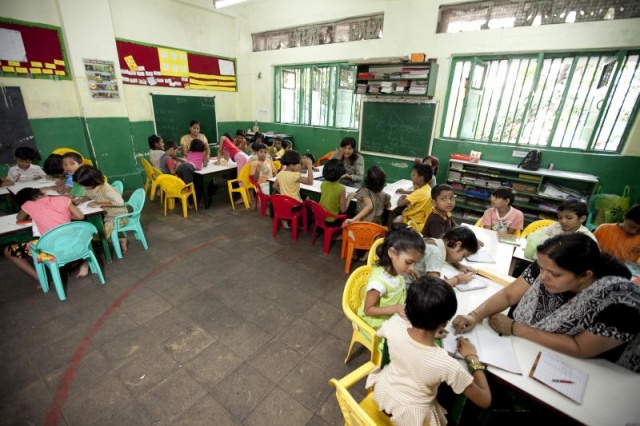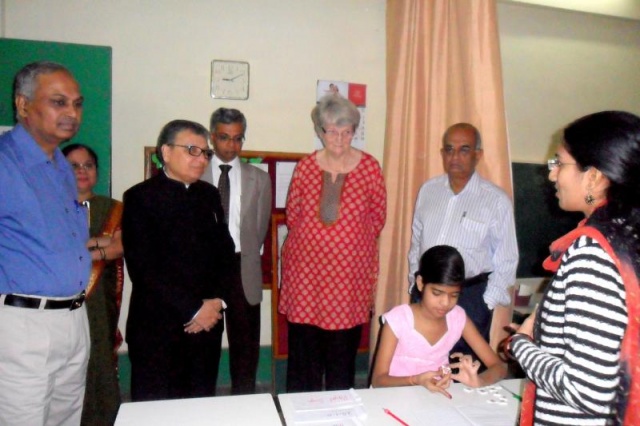Before founding Muktangan, I had spent 35 years working in diverse roles in education across India, and had identified many disconnects in mainstream teacher and school education.
1.) There was minimal systemic connection between teacher education and schools. School teachers could have benefited from ongoing needs-based professional development by teacher education faculty, whilst the faculty tests out the effectiveness of their advocated pedagogy in school classrooms. Indeed, the pedagogy used in teacher education is not in synchrony with the constructivist pedagogy required in school classrooms.
2.) Teacher education – not respecting the continuum of children’s learning – is broken up into early childhood, elementary and secondary, with minimal respect being shown to early childhood, where the roots of all learning begins.
As India’s educational system is megalithic, only the Government can mobilize the financial and human resources to take ideas to scale. NGOs can test out innovations and create models with proven effectiveness for the government to adopt.
At the AVPN India Summit 2017
Muktangan was a Deal Share Live participant at this year’s recent AVPN India Summit, which brought together a diverse group of funders and resource providers to build cross-sector partnerships that drive greater and more effective investment in the Education Sector.
The India Summit has given us a valuable opportunity to share our asks (see below) and solutions to common problems with other organisations. At the same time, we gained insights on how we can help donors to become knowledgeable partners in our journey.
Our journey includes creating the The ‘Hub and Spokes’ Education Model
In partnership with the Municipal Corporation of Mumbai, Muktangan adopted an integrated approach through ‘Education for the Community by the Community’.
It has set up and is running 7 inclusive, government schools (from kindergarten to 10th grade). The teacher education centre acts as the ‘hub’ for teachers from undeserved communities to develop as thinkers, responsible organizers and planners, and effective communicators.
The schools, on the other hand, are the ‘spokes’. Through weekly internship, individual child observation and small group tutorials, Muktangan, supplemented by needs-based vacation professional development, provide:
1.) Curriculum Understanding and Design Meetings for teachers to construct their own understanding of curricular content
2.) English Proficiency Classes as 90% of teachers are vernacular-medium educated. Muktangan schools are English-medium
3.) Pedagogical Modules – 75 minutes weekly for 2 years, related to their professional areas
Scaling, Testing, and Advocating the Model
As a result, using 3 pillars, Muktangan, an initiative of Paragon Charitable Trust, was set up to address these disconnects, and provide a model for the government to leverage upon:
1.) A proven, integrated teacher-and-school-education model for researching pedagogical and leadership processes
2.) Outreach partnerships for testing and strengthening learnings in differing contexts:
Muktangan and Singapore International Volunteers have entered into a 3-year partnership to enhance early childhood pedagogy in the Maharashtra.
The partnership began in July this year with a launch ceremony graced by both the State Secretaries for School Education and Women and Child Welfare.
This was followed by a one-and-half day workshop to train all 25 organizational managers and practitioners working in the field of early childhood.
Moving forward, Muktangan is working with Singapore International Foundation to facilitate workshops for 25 organisations to enhance early childhood pedagogy.
3.) Advocate learnings to policy makers:
For the last 2 years, Muktangan has been in continuous dialogue with the State and Central Government who have been struck by the significance of Muktangan’s learnings to address issues in the mainstream educational system. These conversations are expected to lead to a more conclusive plan of action within the next few months.
Multi-Sector Partnerships with Policy Makers and the Private Sector
Muktangan is currently working in many outreach partnerships, including 2 with the government:
- Active Constructivist Orientated Teacher Education (ACOTE) Project – a pilot project with 10 teacher education colleges each with a network of 5 schools to replicate the “Hub and Spoke” model.
- Capacity building of 271 government tribal aganwadis (Kindergarten), in partnership with Learning Space Foundation (LSF), an NGO working on rural development in tribal areas, north of Mumbai.By appointing Muktangan as their curriculum development partners in Early Childhood, LSF has seen the impact Muktangan had made on the 25 government aganwadis and the lower classes of government schools. To date, the Integrated Child Development Scheme (ICDS), a central government body, has requested Muktangan to build the capacity of 271 more of their aganwadis.
Elizabeth Mehta is the founder of Muktangan.





Comments (0)